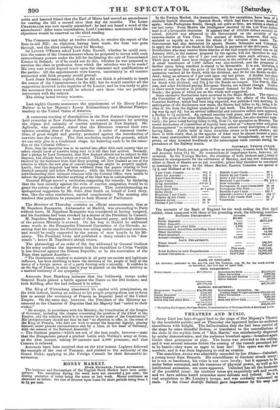A numerous meeting of shareholders in the New Zealand Company
was held yesterday at New Zealand House, to concert measures for averting the stigma and calamity of convict settlement in New Zealand. Mr. Aglionby, who presided, stated that the Directors reserved their own opinion, awaiting that of the shareholders. A series of reasoned resolu- tions, of great weight and gravity, protested against the introduction of convicts into the colony. The first resolution recited the grounds, which we can only give in a condensed shape, for believing such to be the inten- tion of the Colonial Office—
First, that the operation was to be carried into effect with such secrecy that no colony should know of convicts being sent to it till they had arrived. Secondly, that a pledge by Lord Nomianby, that New Zealand should not be subject to this disgrace, had already been broken or evaded. Thirdly, that a despatch had been received by the Governor from Earl Grey pointing out New Zealand as one of the colonies to which the new plan of convict emigration might be properly applied. Lastly, that this despatch had been withheld from the papers relating to New Zealand annually laid before Parliament ; while the Directors of the Company, notwithstanding their intimate relations with the Colonial Office, were unable to inform the proprietors whether anything of the kind was in contemplation.
General Briggs moved a resolution suggesting the remedy, by declaring that the best security against the evils of convict emigration would be to grant the colony a charter of free government. This, notwithstanding an apologetical suggestion by Mr. John Abel Smith on behalf of Lord Grey, was, like the other resolutions, carried unanimously. The meeting also resolved that petitions be presented to both Houses of Parliament.


























 Previous page
Previous page